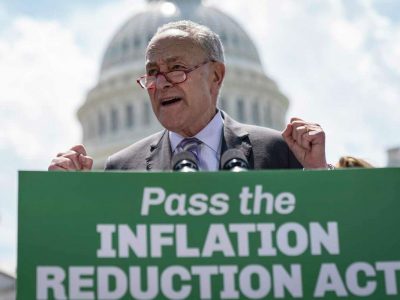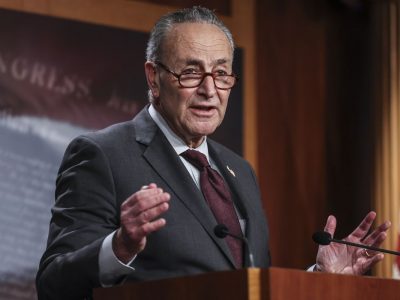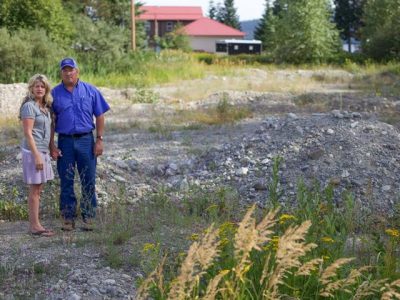A Great Day for Climate Policy
A short video explainer of why passage of the IRA bill is such a big deal.
We all have something to celebrate with the House passage of the IRA on Friday. Getting it passed required some difficult compromises, but the bill represents a major step forward. Because of the Mar-a-Lago search, it hasn't gotten nearly as much attention as it deserves. If you don't have time for a lot of details, here's a three minute video. ...
CONTINUE READINGThe Inflation Reduction Act and the Sequencing of Climate Policy
Why subsidies for clean energy generally are preconditions for other climate policies
The Inflation Reduction Act would be, if enacted, the biggest piece of climate legislation that the U.S. Congress has ever passed. As such, it’s gotten a fair amount of coverage attempting to put it into context for the broader scope of climate policy in the U.S. and globally – in particular, this article in Slate and this article in the New York Times both talk about how the IRA embraces the approach of using subsidies and industrial policy to advance climate goal...
CONTINUE READINGBracket Creep at OIRA
There’s an embarrassing economic blunder in how OIRA’s jurisdiction is defined.
The Biden Administration is considering changes to how OIRA, the “regulatory czar,” operates. There’s one simple fix the Administration should make. OIRA core function is cost-benefit analysis But the rules establishing OIRA’s jurisdiction contain an error that should make an economist blush: using nominal rather than real (inflation-adjusted) dollars. This means that OIRA is now required to review a myriad of rules it never would have bothered with in the pas...
CONTINUE READINGWhy We Can’t Wait
In climate policy, delay is deadly.
There are a lot of complaints about the very real flaws in the Inflation Reduction Act, tied with arguments that we should wait until we can do something better. In climate policy, however, waiting is dangerous. We've already delayed far too long. Further delay means having to cut emission much more rapidly to make up for lost time. That could turn the goal of getting to net zero emissions by 2050 from merely very difficult to virtually impossible. Because cutting c...
CONTINUE READINGMaking Climate Policy Work
New book highlights the weaknesses of carbon pricing in addressing climate policy
I have a new post up at JOTWELL reviewing a recent book from Danny Cullenward at the climate think-tank Carbon Plan, and Professor David Victor of UC San Diego. Their book, Making Climate Policy Work, is a terrific overview of the political and administrative weaknesses of carbon pricing as a tool for climate policy. Please check out my review at JOTWELL, and if you are intrigued, get the book!...
CONTINUE READINGThe Major Money Doctrine
Senate passes biggest climate legislation ever.
In June, the Supreme Court trimmed EPA’s power to regulate greenhouse gases. The Court used the “Major Question Doctrine,” which says that issues of “vast political and economic significance” must be decided by Congress. Senate Democrats gave their response on Sunday: the Major Money Doctrine. They passed the Inflation Reduction Act (IRA), which provides over $300 billion in funding for climate action. The House is expected to pass the IRA on Friday. Here�...
CONTINUE READINGWill the Supreme Court Gut the Clean Water Act?
We’re about to find out in an upcoming case.
What wetlands and waterbodies does the Clean Water Act protect? Congress failed to provide a clear answer when it passed the statute, and the issue has been a bone of contention ever since. The Biden Administration is in the process of issuing a new regulation on the subject. Normally, you’d expect the Supreme Court to wait to jump in until then. Instead, the Court reached out to grab Sackett v. EPA, where landowners take a really extreme position on the subject. Not...
CONTINUE READINGDon’t hamstring carbon removal
California needs to lead in developing critical carbon removal technologies
Assessments by the IPCC have made clear that the most feasible way for the world to meet its target of restricting climate change to below two degrees Celsius of warming includes rapid and massive expansion of carbon removal technology – technology that would extract carbon dioxide and permanently sequester that carbon dioxide underground. California has long been a leader in decarbonization, but proposed legislation in Sacramento would hamstring California’s effor...
CONTINUE READINGTwo and a half cheers for the IRA
Climate legislation sets the stage not just for decarbonization now, but greater policy success later on
The announcement of the legislative deal (the Inflation Reduction Act of 2022) between Senator Joe Manchin (D-WV) and the Democratic Senate leadership was a bid deal in climate policy. The legislation relies on the reconciliation process, allowing it to pass with a simple 50 votes (plus Vice President Harris’ tie-breaker vote). The legislation provides for hundreds of billions of dollars in investments in decarbonization in the American economy – and current esti...
CONTINUE READINGEnvironmental Law in US Law Schools
There are strong programs in schools up and down the pecking order.
Although I've taught environmental law for a long time, my knowledge of the programs at U.S. law schools is pretty hit or miss. In the hope of finding out more, I did a quick survey of U.S. schools. The results make it clear that environmental law has a foothold at law schools of all kinds. Here are the details about my "quick and dirty" survey. My sample was drawn from the membership list of the American Association of Law Schools, which includes 93% of ABA acc...
CONTINUE READING








